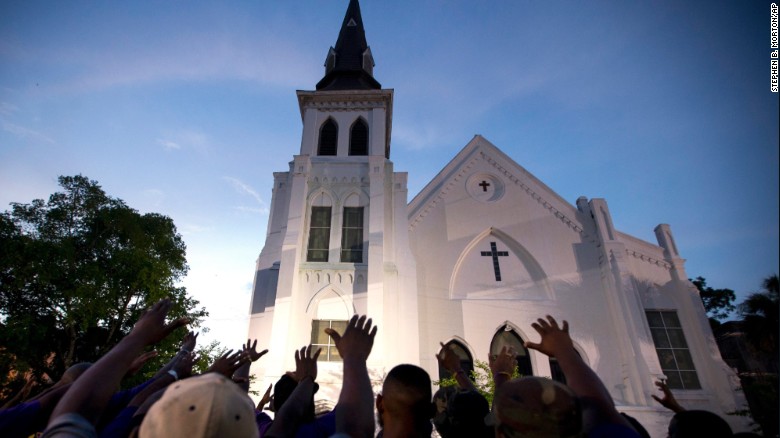
The men of Omega Psi Phi Fraternity Inc. lead a crowd of people in prayer outside the Emanuel AME Church, Friday, June 19, 2015, after a memorial in Charleston, S.C. From cnn.com: click for more.
After people in Charleston were attacked and killed in their place of worship because of their racial identity, I’m thinking about my faith and identity. Learning the killer was a member of a Lutheran congregation adds an uncomfortable urgency.
- Are there faith resources to reveal the racism that hides in plain sight?
- Can Christ create in us a new identity: a forgiven people of all human identities who confront racism and all violence with love until the beloved community comes?
My core conviction is: Yes, there are, and yes, Jesus can. And we have work to do.
I did not discover this on my own. Someone showed me. A teacher, David Rhoads, a New Testament scholar, gave me something to do. It was a new way to know myself and also a new way to know the bible. The classroom exercise started like this:
“Step One: Identify your own social location and note aspects of your social location that may influence your interpretation and application of scripture.”
Social location? I had never heard that phrase before, but this exercise changed my life. It changed how I claim who I am–in myself, in relationship to others, and before God. It changed how I lived and lived my faith and read scripture.
But enough about me. Next week, I’ll say more about what I learned from it. Right now, I want you to do the exercise too. Grab a pen or pencil or open a window to type in. Write out your response. Show the exercise to someone else. Talk about what light it shed, or didn’t. For me, this is essential personal reflection for living an ethical, faithful, anti-racist life.
Here’s all of Step One.
Step One: Identify your own social location and note aspects of your social location that may influence your interpretation and application of scripture.
Social location includes:
1. Your cultural identity or identities (national origin, racial identity, ethnic group)
2. Your place within the culture (including such matters as religion, economic or social class, education, urban/rural origin, occupation, health, family, sexual orientation, legal status, among other things that will differ with each culture)
3. Your individuality (including personal experiences, convictions, identification/solidarity with people from other social locations)
4. Circumstances in your cultural situation that shape your life (wealth or poverty, war or peace, exploitation or discrimination, oppression or freedom, etc)Please add other factors that are not accounted for here. Please also name some of the things in your own social location that may especially influence your interpretation and appropriation of the Bible.
More next week. Peace, PC

[…] picking up where I left off last week: after the Charleston massacre, considering urgent questions about faith and identity. Then, I […]